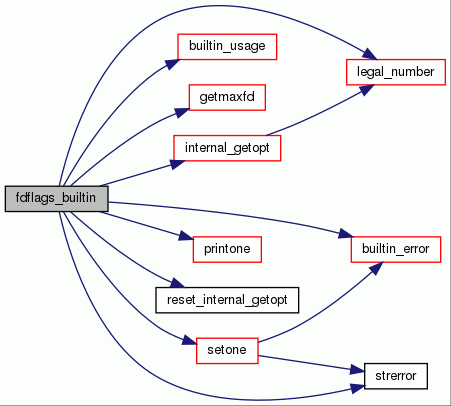#include <config.h>#include <fcntl.h>#include <errno.h>#include "bashansi.h"#include <stdio.h>#include "loadables.h"Go to the source code of this file.
Macros | |
| #define | N_FLAGS (sizeof (file_flags) / sizeof (file_flags[0])) |
Functions | |
| static int | getallflags () |
| static int | getflags (int fd, int p) |
| static void | printone (int fd, int p, int verbose) |
| static int | parseflags (char *s, int *p, int *n) |
| static void | setone (int fd, char *v, int verbose) |
| static int | getmaxfd () |
| int | fdflags_builtin (WORD_LIST *list) |
Variables | |
| struct { | |
| const char * | name |
| int | value |
| } | file_flags [] |
| int | errno |
| char * | fdflags_doc [] |
| struct builtin | fdflags_struct |
Macro Definition Documentation
◆ N_FLAGS
| #define N_FLAGS (sizeof (file_flags) / sizeof (file_flags[0])) |
Definition at line 79 of file fdflags.c.
Referenced by getallflags(), parseflags(), and printone().
Function Documentation
◆ getallflags()
|
static |
Definition at line 87 of file fdflags.c.
References file_flags, i, and N_FLAGS.
Referenced by getflags().

◆ getflags()
|
static |
Definition at line 97 of file fdflags.c.
References builtin_error(), c, errno, getallflags(), and strerror().
Referenced by printone(), and setone().


◆ printone()
|
static |
Definition at line 123 of file fdflags.c.
References file_flags, getflags(), i, N_FLAGS, and builtin::name.
Referenced by fdflags_builtin().


◆ parseflags()
|
static |
Definition at line 152 of file fdflags.c.
References builtin_error(), file_flags, i, n, N_FLAGS, builtin::name, NULL, and p.
Referenced by setone().


◆ setone()
|
static |
Definition at line 191 of file fdflags.c.
References builtin_error(), errno, FD_CLOEXEC, getflags(), n, parseflags(), pos, and strerror().
Referenced by fdflags_builtin().


◆ getmaxfd()
|
static |
Definition at line 222 of file fdflags.c.
References getdtablesize(), and HIGH_FD_MAX.
Referenced by fdflags_builtin().


◆ fdflags_builtin()
| int fdflags_builtin | ( | WORD_LIST * | list | ) |
Definition at line 243 of file fdflags.c.
References builtin_error(), builtin_usage(), CASE_HELPOPT, errno, EX_USAGE, EXECUTION_FAILURE, EXECUTION_SUCCESS, getmaxfd(), i, internal_getopt(), legal_number(), list_optarg, loptend, word_list::next, printone(), reset_internal_getopt(), setone(), strerror(), word_desc::word, and word_list::word.

Variable Documentation
◆ file_flags
| const { ... } file_flags[] |
Referenced by getallflags(), parseflags(), and printone().
◆ errno
| int errno |
Referenced by fdflags_builtin(), getflags(), and setone().
◆ fdflags_doc
| char* fdflags_doc[] |
◆ fdflags_struct
| struct builtin fdflags_struct |
